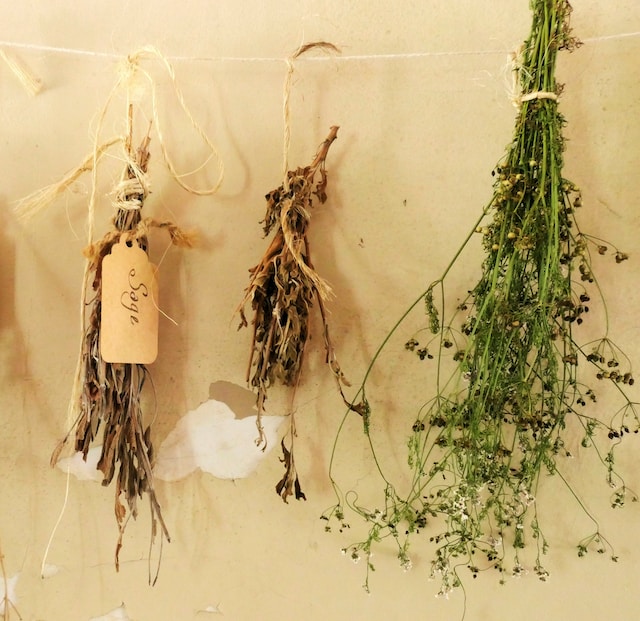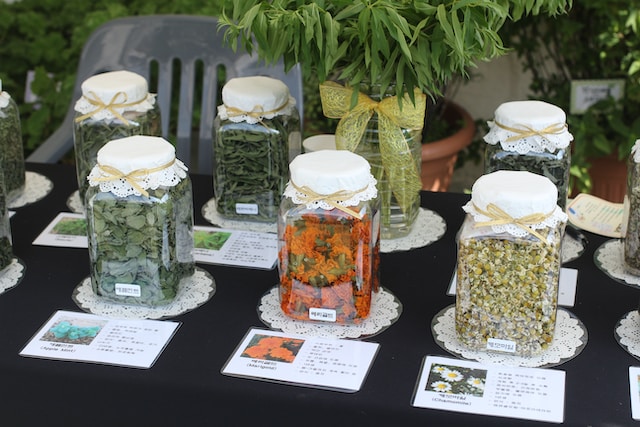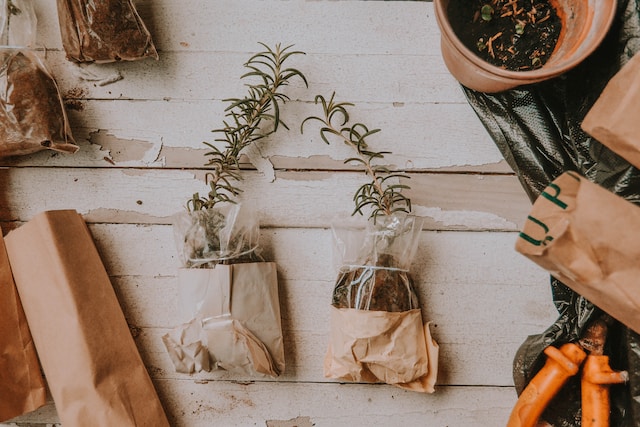Your culinary artistry can be enhanced with the inclusion of herbs. This addition will not only boost the delectable flavor of your dishes but also improve their nutritional value. However, fresh herbs could come at a great cost and, if unused before long would succumb to spoilage despite proper storage conditions. That is why many chefs prefer dried herbs as an affordable substitute that doesn’t compromise on taste or nutrition benefits when used correctly.
In this article, we shall unravel some tips for maximizing freshness in stored dry herbs with simple tricks. We’ll also include ideal means of preservation and prevention you should keep watch so they remain flavorful over prolonged periods.
Importance Of Storage

It is essential to preserve the longevity and quality of dried herbs by storing them properly. Dried herbs possess intense flavor, but they have volatile oils that vanish quickly if not well preserved. This issue results in losing their aroma or taste which makes these useful herbs unusable for culinary or medicinal purposes.
Furthermore, mold and bacteria can attack dried plants when exposed to moisture. Thus, spoilage is unavoidable without proper storage measures taken beforehand. Storing your dried herbs correctly will keep humidity from accumulating on them. This will avoid decay risks while guaranteeing safety upon consumption whenever needed.
Properly preserving your aromatics ensures lasting, high-quality flavors and aromas, adding value overall!
Things To Consider When Storing Dried Herbs

🟦 Temperature
Drying herbs might sound simple, but their quality and durability can be influenced by the temperature of storage. Storing them in a dry place with temperatures ranging from 60-70°F (15-21°C) would keep dried herbs fresh for longer periods. Direct exposure to light or heat could cause essential oils to evaporate which reduces their potency and flavor. Hence, it’s best to avoid storing such items close to cooking appliances like a stove or oven that emit high temperatures or direct sunlight from windows. Dried herbs will maintain optimal freshness if stored inside an enclosed pantry or cupboard location within your premises. These will offer dark conditions, and be free from pollution factors which are liable for contamination risks!
🟦 Airflow
It is best to keep dried herbs in tight containers so that air does not circulate and ruin their taste or scent. The essential oils within the leaves will decompose when paired with oxygen, resulting in a loss of potency. Metal tins or glass jars are fantastic storage options as they have lids that fit securely on top of them, ensuring protection from outside elements.
🟦 Humidity
Should herbs come into contact with excess moisture, they have a tendency to become lumpy and lose their value due to decay. Storing them in an environment with low humidity is pivotal for preservation purposes. Avoid housing these delicate plants in places like the kitchen or bathroom where high levels of moist air are prone. If you happen to dwell within such regions that experience heightened dampness, consider using an appliance like a dehumidifier. This reduces airborne water content substantially. Furthermore, ensure your herbal possessions undergo ample drying before putting them away so as not to leave any remnant fluids behind that could be liable to deterioration gradually over time.
(This goes the same with spices, which you can read here.)
🟦 Container
It is essential that the container used for dried herb storage does not have any reactivity with herbs or alter their flavor. Suitable options are jars made of glass, as well as ceramic containers having tight-fitting lids. These containers do a great job of preserving taste and avoiding contamination. It’s advisable to avoid plastic packaging at all costs. This is because it can emit harmful chemicals into your valuable stockpile.
🟦 Labeling
Labeling your dried herbs with the herb type and date of purchase is crucial. This is to prevent any future confusion when cooking and ensure that you use them before they pass their expiration date. It’s optimal to consume dried herbs within six months up to a year from their purchase for an ideal flavor profile.
Prolonging usage could lead to these dry shrubs losing significant potency over time. To avoid this issue it’s best not to buy in bulk but rather invest in small amounts which can be used up rapidly. This will maximize the freshness potential while avoiding spoilage complications. Proper labeling methods are essential essentially allowing one never to forget how long ago they purchased or last utilized said seasoning. This will ultimately maintain maximum efficiency while reducing waste by using what was once lost amongst cluttered kitchen cabinets!
Steps To Store Dried Herbs For Long-term Use

🟩 Clean the herbs
To prepare for storage, ensure the herbs are devoid of any unwanted dirt or debris. To clean dried herbs, give them a gentle shake over either a sieve or colander to extract any remaining dust and grime. You can also use soft-bristled brushes for removing noticeable spots on your herb plants with care so that they do not get damaged in the process. Additionally, you could rinse particularly dirty ones off under cold running water as long as all moisture is completely evaporated before putting them away safely stored out of direct sun exposure once again.
🟩 Remove stems
There are certain herbs that possess harder stems which may potentially create an unfavorable eating experience as well as deteriorate the taste and overall worthiness of the dehydrated herb. For instance, thyme and rosemary have sturdier stems that can be extracted pre-drying. The following techniques will assist in removing these stems.
Grasp the stem with your hand while delicately pulling off any leaves utilizing solely one’s fingers. Or, alternatively use a pair of scissors or perhaps even an herb stripper tool to accomplish this task.
🟩 Store in airtight containers
You could make use of glass, metal, or plastic receptacles to ensure air cannot penetrate to safeguard the dried herbs. Containers made from materials like porous paper or cardboard should be avoided. This is because they can absorb moisture and jeopardize herb quality. The tightness of fit between the container lid and base must also not be undermined so as to maintain potency levels in the face of any possible exposure to air currents within storage spaces.
🟩 Store in a cool, dark place
It is imperative to keep the desiccated spices in a cold, obscure place that isn’t close to sources of heat and sunlight. The herbs may lose their strength and flavor if exposed to high temperatures or direct light. A pantry, cabinet, or closet can be an optimum storage spot for them. It’s important not to stash these plants near areas like stovetops, sinks, or dishwashers because the moisture from cooking and cleaning might lead decay of aroma.
🟩 Avoid exposure to moisture
Dampness poses a threat to dried herbs. To avoid any moisture entering the enclosures, ensure that the herbs are fully arid before keeping them away. In case you cleanse your herbs prior to drying them out, see to it that they have thoroughly dried up before preservation. Furthermore, check if the containers completely lack dampness prior to putting in the plants within.
🟩 Consider vacuum sealing
In the event that you possess a device for vacuum sealing, it would be wise to utilize its function and extract all air contents from your container prior to closure. Such action will effectively extend the duration of time in which your herbs remain flavorful and fresh, maintaining their quality throughout that period as well. Additionally, when applying this technique for storage purposes at selected locations, the enclosed vessel serves as means of prevention against any unsavory odors penetrating through into those aromatic herbs.
Best Types Of Containers For Storing Dried Herbs
🟪 Glass jars with tight-fitting lids
Storing dried herbs can be achieved by opting for classic glass jars. These containers have been known to not interact with your herbs, keeping their flavor and potency intact. They also do not retain any odors or flavors of their own which is crucial in maintaining the originality of your herb’s aroma. To preserve the quality over time, it is important that a lid seals tightly preventing moisture exposure as well as air and light degradation. Therefore, choosing Mason jars or other hermetically sealed glassware would work best when storing dried herbs.
🟪 Metal tins with tight-fitting lids
Containers made of metal, similar to those that are utilized for tea or coffee storage purposes may prove advantageous alternatives when storing dried herbs. Such tins have properties that resist reactions and guard the contents against moisture and air infiltration.
Nonetheless, a few types of metals can still engage in reactions with specific herbs. You should carefully deliberate on selecting an appropriate metal based on the kind of herb being stored. Furthermore, if daylight exposure is worrisome to you, then, it’s noteworthy that using metallic containers might not be ideal seeing as they lack light-blocking abilities.
🟪 Vacuum-sealed bags
Vacuum-sealed pouches present a novel option for conserving dried herbs. The bags function via the elimination of air content within the bag to maintain taste and potency. You may opt for these packs if you desire convenience as they occupy less room than traditional tins or jars. This can also be stored discreetly in drawers or pantries without much hassle. Yet not as resilient when compared to metal or glass containers, thus necessitating more frequent change-outs of used packets after prolonged use.
🟪 Ceramic jars with tight-fitting lids
There is another alternative for preserving your dried spices: ceramic jars! Similar to glass, these containers are non-reactive and can prevent moisture and air from getting in. Nevertheless, particular types of ceramics may be penetrable permitting light contact that could cause a decrease in the herb’s value over time. Be careful when selecting an opaque ceramic jar with a tight-fitting cap so as not to allow light infiltration or entry of unwanted elements like moisture or air.
How To Tell If Dried Herbs Have Gone Bad

🟧 Color change
A clear indicator that your dried herbs may be stale is when their color has altered. Gradually, the plants will begin to lose their vividness, and shades of hue shall start diminishing. In case you spot brown or silver colors on them, this suggests a deterioration in both scent and taste. This occurs because oils responsible for flavoring tend to decompose with age. It’s advisable not to use such herbs. Instead, replace them entirely so as not to compromise your meal quality.
🟧 Loss of fragrance
A sign that your dehydrated spices have spoiled is a diminution of scent. Dried herbs are popular for their individual fragrance. So, if they no longer carry this aroma or possess an old odor, it’s indicative that the quality has diminished. When the oils in these plants decompose, they will start to lose their smell which means they’re not as effective when used to season dishes. Suppose you detect any loss of fragrance at all. Then, it would be prudent to change them with fresh ones so you can guarantee excellent taste in your cooking endeavors.
🟧 Texture change
As time passes, the consistency of dried plant leaves can shift. Should you find that said herbs have become damp or fused together, it may indicate a decline in quality and spoilage. Dampness is notorious for sapping essences from these herbs rendering them less potent as flavor enhancers within culinary creations. Not to mention resulting clumps that impede their use in food prep entirely. If you observe changes concerning this aspect of your dried herb supply, discarding such portions would prove most beneficial. Consider initiating a restock with fresh supplies to guarantee continued success around mealtime!
🟧 Mold or pests
Indications of dried herbs gone bad are mold and pests. Inspect for hints of molds or infestations, like insects or webs. Throwing away the herbs is best if any indications appear as it can be harmful to consume contaminated plants that could lead to illness caused by molds. Moreover, pesky bugs might harm your herb’s effectiveness in seasoning dishes while cooking! Replacing them with fresh ones when noticing these signs ensures maintaining high-grade dish quality during mealtime preparation.
🟧 Expiration date
It is crucial to examine the date of expiry written on your dry herbs packaging. This primary measure will help you detect their state in case they are spoilt or not. The majority of dried herbs have an explicit expiration timeline. But if it elapses, there’s a high probability that both scent and flavor would diminish while usage might turn out unsafe for human consumption. If at any point you discover that these plants’ validity period has lapsed, then opting for new ones becomes mandatory as culinary quality can thereby be assured without compromise.
Conclusion
As we conclude, the appropriate storage of dried herbs can lengthen their shelf life and maintain both their effectiveness and taste. To preserve them optimally, it is crucial to store them in an area where heat, light, or moisture cannot get in to avoid corruption while retaining their quality.
Furthermore, keeping these herbs in tightly sealed containers with clear labeling showing dates of storage will aid you in monitoring freshness levels preventing any mix-up mistakes from occurring. By applying these straightforward suggestions effectively, you can enjoy all-year-round benefits without having a considerable decrease in the need for restocking supplies!
Frequently Asked Questions
Q1: What are the safety measures when using dried herbs?
A: Certain dehydrated plants may prove poisonous upon excessive consumption. Therefore, it is imperative to utilize them in appropriate amounts and adhere to the recommended doses of any herbal remedies. Engaging with a healthcare professional prior to utilizing herbal medication might also be wise, especially for those under medical treatment or who have existing ailments.
Q2: Can I mix various types of dried herbs in one container?
A: Indeed, it is feasible to combine various forms of dried herbs to manufacture customized concoctions. This method could be an enjoyable tactic for sampling diverse tastes and creating distinctive dishes.
Q3: How to use dried herbs in cooking?
A: In order to incorporate dried herbs into a dish, it is optimal to add them in the initial stages of cooking. This allows adequate time for rehydration and flavor infusion. Proper usage involves minimizing quantity due to their potency.
Q4: Can I still use expired dried herbs?
A: While using expired dried herbs won’t necessarily harm you, they may have lost some of their potency and flavor. It’s best to replace old herbs with fresh ones for the best flavor and health benefits.
Q5: Can I substitute dried herbs for fresh herbs?
A: Certainly, it is possible to replace fresh herbs with dried herbs in culinary preparations. Nonetheless, one must exercise caution as the potency of the flavor increases when using dry herb varieties. Normally speaking, a measurement of 1 teaspoonful for dehydrated herbs can be substituted for every tablespoon full that’s required from its fresher counterpart.
